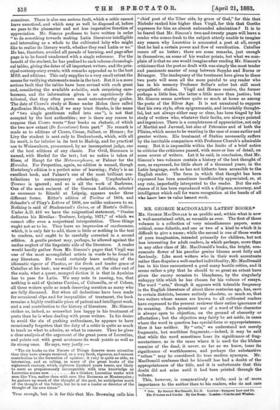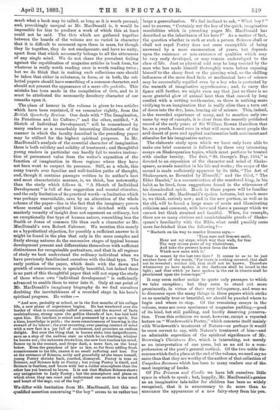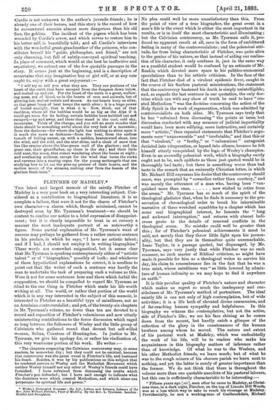MR. GEORGE MACDONALD'S LATEST BOOKS.* Mu. GEORGE MeeDoNALD is as
prolific and, within what is now a well-ascertained orbit, as versatile as ever. The first of these volumes is a collection of very miscellaneous papers, some critical, some didactic, and one or two of a kind to which it is difficult to give a name; while the second is one of those works of pure imagination, intended primarily for children, but not less interesting for adult readers, in which perhaps, more than in any other class of Mr. MacDonald's books, the bright, consumnate flower of his peculiar genius blooms most fully and flawlessly. Like most writers who in their work accentuate rather than disguise a well-marked individuality, Mr. MacDonald has in his time encountered a good many hostile critics, and it seems rather a pity that he should to so great an extent have given the enemy occasion to blaspheme, by the singularly unhappy title which he has chosen for his volume of essays. The word "orta," though it appears with tolerable frequency in the English literature of about three centuries ago, has, save in certain districts, become entirely obsolete, so much so, that two writers whose names are known to all cultivated readers have expressed to the present reviewer their entire ignorance of its meaning. Such prominent use of a word of this character is always open to objection, on the ground of obscurity or affectation ; but the objection may fairly be set aside, in cases where the word in question has special force or appropriateness. Here it has neither. By " orts," we understand not merely fragments, but worthless fragments,—indeed, it may be said that while the word sometimes loses its significance of fragmentariness, as in the cases where it is used for the lifeless remains of the dead, it never, so far as we know, loses its significance of worthlessness, and perhaps the substantive " refnse " may be considered its true modern synonym. Mr. MacDonald confesses that he himself has had a• doubt of the appropriateness of the title, and it is unfortunate that this doubt did not arise until it had been printed through the volume.
This, however, is comparatively a trifle, and is of more importance to the author than to his readers, who do not care much what a book may be called, so long as it is worth perusal; and, provokingly unequal as Mr. MacDonald is, it would be impossible for him to produce a work of which this at least could not be said. The Orts which are gathered together between the boards of the volume are so varied in character that it is difficult to comment upon them in mass, for though they lie together, they do not amalgamate, and have no unity, apart from that which necessarily belongs to all the utterances of any single mind. We do not share the prevalent feeling against the republication of magazine articles in book form, for whatever is really worth reading once is worth reading twice ; but we do think that in making such collections care should be taken that either in substance, in form, or in both, the collected papers should have something of a common character, and should not present the appearance of a mere olla podrida. This mistake has been made in the compilation of Orts, and to it must be attributed the necessarily desultory character of our remarks upon it.
The place of honour in the volume is given to two articles which have been reprinted, if we remember rightly, from the British Quarterly Review. One deals with " The Imagination, its Functions and its Culture;" and the other, entitled, "A Sketch of Individual Development," will be remembered by many readers as a remarkably interesting illustration of the manner in which the faculty described in the preceding paper. may be utilised for the highest spiritual purposes. In Mr.
MacDonald's analysis of the essential character of imagination there is both subtlety and solidity of treatment; and thoughtful young readers in particular can hardly fail to receive instruction of permanent value from the writer's exposition of the function of imagination in those regions where they have not been wont to suspect its presence. Still, as a whole, this essay travels over familiar and well-trodden paths of thought, and, though it contains passages written in its author's best and most characteristic manner, is, we think, less noteworthy than the study which follows it. " A Sketch of Individual Development" is full of fine suggestion and mental stimulus, and the only limitation of its practical worth—a limitation which was perhaps unavoidable, save by an alteration of the whole scheme of the paper—lies in the fact that the imaginary person whose mental and spiritual history is sketched with such masterly veracity of insight does not represent an ordinary, but an exceptionally fine type of human nature, resembling less the Smith or Jones of common life than such a character as Mr. MacDonald's own Robert Falconer. We mention this merely as a hypothetical objection, for possibly a sufficient answer to it might be found in the plea that only in the more complex and finely strung natures do the successive• stages of typical human development present and differentiate themselves with sufficient distinctness for recognisable portraiture, and that in all regions of study we best understand the ordinary individual when we have previously familiarised ourselves with the ideal type. The early portion of the paper, which deals with the dawn and growth of consciousness, is specially beautiful, but indeed there is no part of this thoughtful paper that will not repay the study of those whose own "individual development" is sufficiently advanced to enable them to enter into it. Only at one point of Mr. MacDonald's imaginary biography do we find ourselves doubting the inevitableness of a recorded stage in his hero's spiritual progress. He writes :—
"And now, probably at school, or in the first months of his college life, a new phase of experience begins. He has wandered over the border of what is commonly called science, and the marvel of facts multitudinous, strung upon the golden threads of law, has laid hold upon him. His intellect is seized and possessed by a new spirit. For a time, knowledge is pride ; the mere consciousness of knowing is the reward of its labour ; the ever recurring, ever passing contact of mind with a new fact is a joy full of excitement, and promises an endless delight. But over the thing that is known sinks into insignificance, save as a step of the endless stair on which he is climbing, whither he knows not ; the unknown draws him, the new fact touches his mind, flames up in the contact, and drops dark, a mere fact, on the heap below. Even the grandeur of law as law, so far from adding fresh consciousness to his life, causes it no small suffering and loss. For at the entrance of Science, nobly and gracefully as she bears herself, young Poetry shrinks back, startled, dismayed. Poetry is true as Science, and Science holy as Poetry; but young Poetry is timid, and Science is fearless, and bears with her a colder atmosphere than the other has yet learned to brave. It is not that Madam Science shows any antagonism to Lady Poetry ; but the atmosphere and plane on whioh alone they can meet and understand one another is the mind and heart of the sage, not of the boy."
We differ with hesitation from Mr. MacDonald, but this unqualified assertion concerning "the boy" seems to us rather too
large a generalisation. We feel inclined to ask, " What boy and to answer, " Certainly not the boy of the quick, imaginative sensibilities which in preceding pages Mr. MacDonald has described as the inheritance of his hero P" As a matter of fact, the question whether in such or such a person Science shall or shall not expel Poetry does not seem susceptible of being answered by a mere enumeration of years. but depends• upon the existence or non-existence of qualities which may be very early developed, or may remain undeveloped to the close of life. Just as physical cold may be long resisted by the man who has made himself thoroughly warm before exposing himself to the sharp frost or the piercing wind, so the chilling influences of the mere dead facts or mechanical laws of science may be successfully repelled even by a boy who is protected by the warmth of imaginative apprehension ; and, to carry the
still further, we might even say that just as there is no more grateful glow of animal heat than that caused by long conflict with a cutting north-easter, so there is nothing more vivifying to an imagination that is really alive than a turn out • of doors into the dry, keen, bracing air of science. This, indeed, is the recorded experience of many, and to mention•. only one name by way of example, it is clear from the recently published record of the early years of Sir William Rowan Hamilton that he, as a youth, found even in what will seem to most people the arid desert of pure and applied mathematics both nutriment and stimulus for his imaginative nature.
The elaborate study upon which we have only been able to' make one brief comment is followed by three very interesting essays on Shakespearian topics, which must perforce be treated with similar brevity. The first, " St. George's Day, 1564," is devoted to an exposition of the character and mind of Shakespeare, as made manifest in his life and works ; the scope of the second is made sufficiently apparent by its title, "The Art of Shakespeare, as Revealed by Himself;" and the third, " The Elder Hamlet," is a reconstruction of the murdered king, in his habit as he lived, from suggestions found in the utterances or his disembodied spirit. Much in these papers will be familiar to hearers of Mr. MacDonald's spoken lectures, but much more is, we think, entirely new ; and in the new portion, as well as int the old, will be found a large mass of acute and illuminating criticism and comment, with here and there a passage which we cannot but think strained and fanciful. When, for example,. there are so many obvious and unmistakeable proofs of Shakespeare's familiarity with the Bible, what could possibly seem more far-fetched than the following ?—
" Macbeth on his way to murder Duncan says,—
'Thou sure and firm-set earth, Hear not my steps, which way they walk, for fear Thy very stones prate of my whereaboat, And take the present horror from the time Which now suits with it.'
What is meant by the last two lines ? It seems to ns to be just another form of the words, For there is nothing covered, that °ban not be revealed ; neither hid, that shall not be known. Therefore whatsoever ye have spoken in the darkness shall be heard in the light ; and that which ye have spoken in the ear in closets shall be proclaimed upon the house-tops.' " It may seem rather unfair to quote only passages to which we take exception ; but they seem to stand out more prominently, in virtue of their very infrequency, and were we to discourse upon the many things in these papers which strike us as specially true or beautiful, we should be puzzled where to begin and where to stop. Of the remaining -essays in the volume, some are mere specimens of magazine padding,—good of its kind, but still padding, and hardly deserving preservation. From this criticism we must, however, except a reported lecture on " Wordsworth's Poetry," which concerns itself mainly with Wordsworth's treatment of Nature—or perhaps it would be more correct to say, with Nature's treatment of him—and an admirable exposition of the spiritual significance of Kr. Browning's Christmas Eve, which is interesting, not merely as an interpretation of one poem, but as an aid to a comprehension of the poet's general method. Of the two noble discourses which find a place at the end of the volume, we need say ncs more than that they are worthy of the author of that collection of Unspoken Sermons which has been to many readers one of the most inspiring of books.
Of The Princess and Curdle we have left ourselves. little space in which to speak ; but, happily, Mr. MacDonald:8 genius as an imaginative tale-teller for children has been so widely recognised, that it is unnecessary to do more than to announce the appearance of a new fairy-story from his pen. Curdie is not unknown to the author's juvenile friends ; he is already one of their heroes, and this story is the record of how he encountered enemies almost more dangerous than his old foes, the goblins. The incident of the pigeon which has been wounded by Curdie's arrow, and which serves to restore him to his better self, is beautifully told ; and all Curdie's interviews with the wonderful great-grandmother of the princess, who constitutes herself his " guide, philosopher, and friend," are not only charming, but full of subtly-conveyed spiritual teaching. in place of comment, which would at the best be ineffective and expatiatory, we extract one of the few quotable passages in the story. It comes just at the beginning, and is a description of mountains that any imaginative boy or girl will, or at any rate 'ought to, enjoy with a great enjoyment :—
" I will try to tell you what they are. They are portions of the heart of the earth that have escaped from the dungeon down below, and rushed up and out. For the heart of the earth is a great, wallowing mass, not of blood, as in the hearts of men and animals, but of glowing-hot, melted metals and stones. As our hearts keep us alive, .so that great lamp of heat keeps the earth alive ; it is a huge power of buried sunlight, that is what it is. Now, think, out of that cauldron, where all the bubbles would be as big as the Alps if it -could get room for its boiling, certain bubbles have bubbled out and -escaped,—up and away, and there they stand in the cool, cold sky, mountains. Think of the change, and you will no more wonder that there should be something awful about the very look of a mountain; from the darkness—for where the light has nothing to shine upon it is much the same as darkness—from the beat, from the endless tumult of boiling unrest, up, with a sudden, heavenward shoot, into the wind, and the cold, and the star-shine, and a cloak of snow that lies like ermine above the blue-green mail of the glaciers; and the -great sun, their grandfather, up there in the sky ; and their little cold aunt, the moon, that comes wandering about the house at night ; and everlasting stillness, except for the wind that turns the rocks and caverns into a roaring organ for the young archangels that are studying how to let out the pent-up praises of their hearts, and the molten music of the streams, rushing ever from the bosom of the glaciers fresh-born."




































 Previous page
Previous page